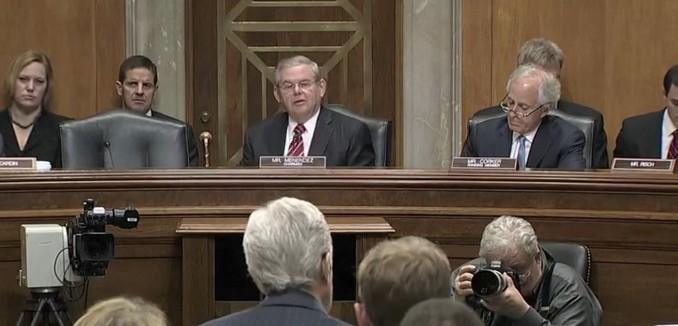A bill mandating legislative review of any potential nuclear deal with Iran passed the Senate today by an overwhelming 98-1 margin, signalling bipartisan veto-proof support, The New York Times reported today. Sen. Tom Cotton (R-Ark.) was the sole dissenting vote, doing so on constitutional grounds, and Sen. Barbara Boxer (D-Calif.) was absent.
A bill that would give Congress a voice in any nuclear agreement between world powers and Iran passed the Senate overwhelmingly Thursday afternoon. …
Republican infighting prevented a debate of significant amendments to the bill, leaving some members deeply unhappy that they were unable to weigh in further on a matter that many said was the most significant of their careers. But in the end, a bipartisan accord that seemed nearly impossible in the upper chamber just a few months ago came together by a convincing margin.
The Iran Nuclear Agreement Review Act of 2015, otherwise known as the Corker-Menendez bill after authors Senators Bob Corker (R-Tenn.) and Robert Menendez (D-N.J.), calls on the administration to share classified elements of a potential nuclear deal to Congress, and allows Congress to review the deal.
The bill that passed the Senate Thursday would require that the administration send the text of a final accord, along with classified material, to Congress as soon as it is completed. It also halts any lifting of sanctions pending a 30-day congressional review, and culminates in a possible vote to allow or forbid the lifting of congressionally imposed sanctions in exchange for the dismantling of much of Iran’s nuclear infrastructure.
The administration furiously tried fight off any legislative oversight of a deal with Iran. But when Corker and Sen. Ben Cardin (D-Md.) crafted a compromise bill leading to veto-proof, bipartisan support, the administration backed off of its veto threat, leading National Journal to characterize the White House as a loser in the political maneuvering around the bill.
The Obama administration didn’t want this bill and threatened to veto it weeks ago. But the bill was moving toward a veto-proof majority. Rather than risking a bipartisan rebuke, the White House and Democrats negotiated key changes, including removal of a provision that would have required regular certification that Iran was not supporting terrorism against the U.S. or U.S. persons. If there’s a final U.S.-Iran deal this summer, Congress is unlikely to upend it, but the bill nonetheless forces the White House to share more information.
The bill passed out of the Senate Foreign Relations Committee last month with a unanimous 19-0 vote.
[Photo: wochit news / YouTube ]




